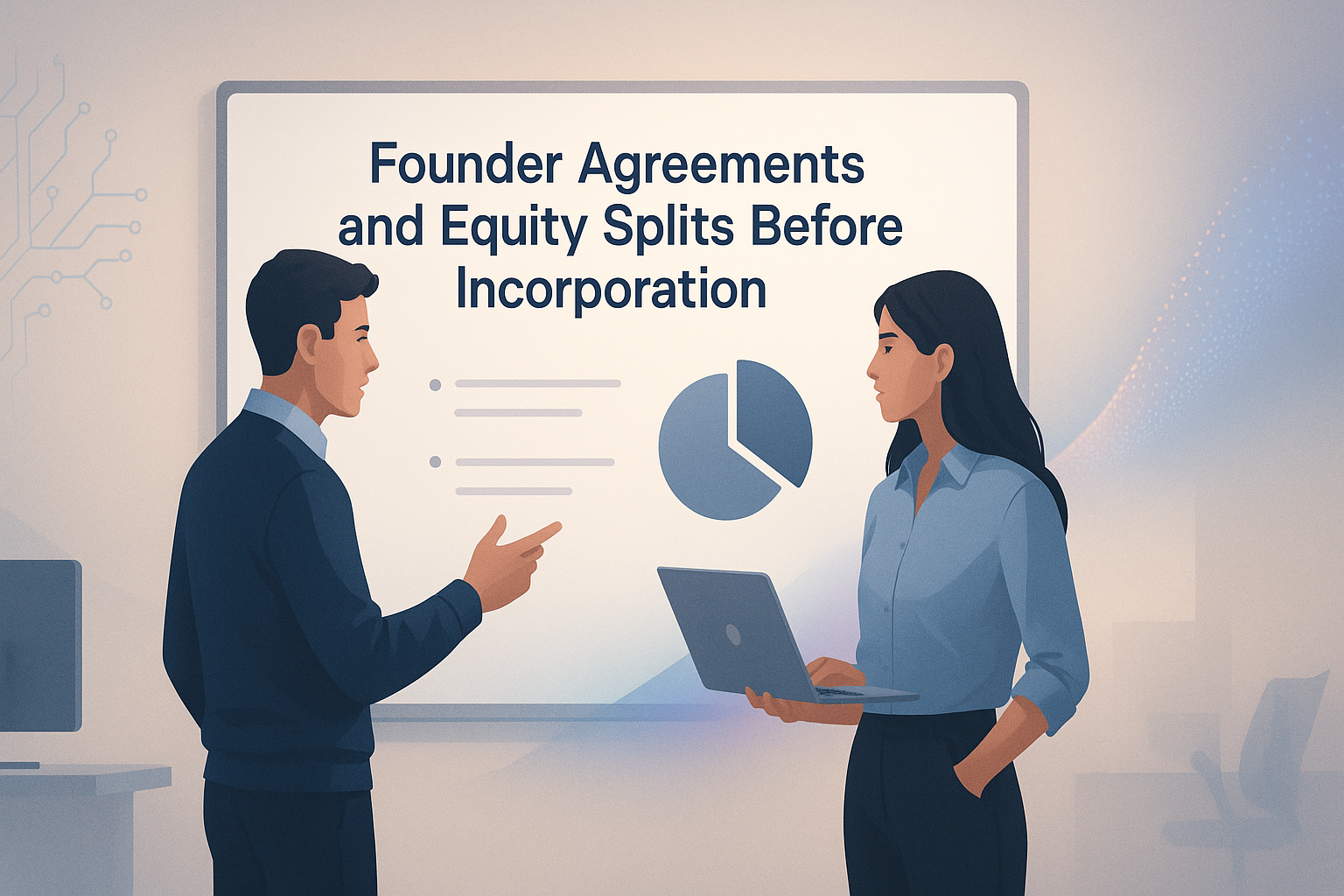
Founder Agreements and Equity Splits Before Incorporation

Founder Agreements and Equity Splits Before Incorporation

Introduction
As a startup founder, navigating the early stages of your business is a critical time that lays the groundwork for future success. One of the essential steps during this phase is establishing clear founder agreements and defining equity splits before formal incorporation. This document seeks to explore why these elements are indispensable and how they can positively influence your startup's trajectory.
Why Founder Agreements Are Important
A founder agreement is a foundational document that outlines the relationships between co-founders and sets expectations regarding roles, responsibilities, equity ownership, and more. Here are several reasons why putting this agreement in place before incorporation is crucial:
- Clarity and Structure: Clearly defining roles and responsibilities helps to prevent misunderstandings and conflicts as the startup grows. Each founder must know their areas of responsibility and the expectations placed upon them.
- Equity Distribution: Detailing how equity is split among founders ensures that everyone feels fairly compensated for their contributions. This is especially important in aligning incentives and motivating founders to commit fully to the startup's success.
- Protection Against Future Disputes: Establishing ground rules in a founder agreement can help avoid disputes that may arise later. Issues such as decision-making authority, equity splits in case of departure, and the assignment of intellectual property rights to the startup will be outlined clearly, which provides a reference point for all parties.
- Investor Confidence: When seeking funding, potential investors will look favorably upon a startup with a clearly defined governance structure. A well-drafted founder agreement signals that the founders are serious about their business, enhancing credibility.
How to Structure a Founders’ Agreement
When crafting a founder agreement, consider including the following key components:
- Roles and Responsibilities: Clearly define each founder's role within the company, including day-to-day management functions and long-term strategic responsibilities.
- Equity Ownership: Specify the percentage of equity each founder will receive based on their contributions, whether they are cash, intellectual property, or services.
- Vesting Schedule: To protect the team and company from potential risks, a vesting schedule can be implemented (applied as “reverse vesting” when equity issued upon incorporation). This means that equity is “earned” over time, ensuring that founders remain committed to the startup's long-term success.
- Exit Strategy: Define what happens if a founder wants to leave the company, including any buyout clauses or rights of first refusal. This clarity helps to resolve potential conflicts in the future.
- Decision Making & Dispute Resolution: Include clear mechanisms for making decisions at all levels of management, board of directors and shareholders, and for resolving disputes, each of which can help minimize tension and facilitate amicable solutions.
Determining Equity Splits Before Incorporation
Equity splits should be approached thoughtfully, as they set the tone for founder dynamics and ownership structure. Here are practical steps to determine fair equity splits:
- Assess Contributions: Evaluate the contributions of each founder based on their skills, time commitment, and resources invested. This assessment can lead to a more equitable division of equity.
- Discuss Future Contributions: Recognize that roles may evolve over time. Consider both current and anticipated future contributions, particularly if one founder has expertise critical to the startup's success.
- Negotiate Openly: Engage in candid discussions about equity expectations. Open negotiation can uncover potential misunderstandings and allow each founder to voice their perspective.
- Be Prepared to Compromise: Equity divisions require flexibility, as no single "one-size-fits-all" formula applies. Striking the right balance between fairness and incentive alignment is key.
- Consult Professionals: If needed, seek advice from legal or financial advisors to ensure that the splitting methodology is sound and complies with relevant laws and regulations.
Conclusion
Setting up founder agreements and defining equity splits before incorporation is a critical step that lays the foundation for your startup's success. By prioritizing this process, founders can align their goals, clarify expectations, and foster strong, collaborative relationships within their team. As you build your startup in the competitive landscape of today’s market, ensure that these foundational elements are addressed with care and professionalism, preparing your venture for growth and attracting the right investors.
Navigating the complexities of equity splits and founder agreements can seem daunting, but as a startup founder, having these frameworks established early will mitigate future risks and bolster the legitimacy of your venture.